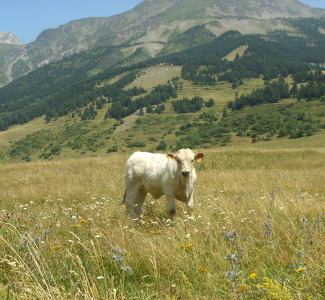Abortions in dairy cows

Neosporosis is a disease caused by the protozoan Neospora caninum. It was first described in dogs but affects cattle as well, becoming a disease of international concern, as it is a significant cause of abortion in cattle in many countries. Neospora infection has also been associated with increased culling and reduced milk yield and it is responsible for a reduction in the value of female breeding cattle. This research has established which antibody proportions are related to an increase or decrease of the possibilities of abortion among Neospora-seropositive animals.
Neospora caninum is an obligate intracellular protozoan closely related to Toxoplasma gondii that was first described in dogs in 1984 and identified since then in a wide range of warm-blooded animals. Bovine neosporosis has emerged as a disease of international concern, being a significant cause of abortion in cattle in many countries. Abortion is the main clinical manifestation of bovine neosporosis in both dairy and beef cattle. Neospora infection has also been associated with increased culling and reduced milk yield and it is responsible for a reduction in the value of female breeding cattle.
N. caninum infection has been reported worldwide. Gamma interferon (IFN-γ) production has been attributed a protective role against abortion in Neospora-infected dairy cows. This study investigate possible relationships between plasma levels of the N. caninum-specific immunoglobulin (Ig) isotypes IgG1 and IgG2 and IFN-γ production throughout gestation in dairy cows naturally infected with the parasite.
Data were obtained from 31 pregnant Neospora-seropositive animals. Blood samples were collected on gestation days 40, 90, 120, 150, 180 and 210 or until abortion. As results we observed that:
- Ten pregnancies ended in abortion.
- One of the 11 cows producing IFN-γ suffered abortion (9.1% of the cows producing IFN-γ). Non-aborting cows producing IFN-γ (n = 10) showed a significantly higher IgG2/IgG1 antibody ratio throughout the gestation period than cows not producing IFN-γ (n = 11).
- A significant negative effect of IFN-γ production on IgG1 antibodies was also observed, while IFN-γ production did not affect IgG2 antibody levels.
- In contrast, higher levels of IgG2 antibodies compared to IgG1 antibodies were observed over the whole of gestation in aborting animals, both in those not producing IFN-γ and in the single aborting cow that produced the cytokine.
Our findings indicate that a Th1 immune response, in which IgG2 antibodies prevail, could be protective against N. caninum abortion, but only in the presence of IFN-γ production. On their own, elevated IgG2 antibody titres appear to be insufficient to protect dams chronically infected with N. caninum against abortion.
Figure 1. IgG2/IgG1 ratios (mean ± SEM) thoroughout gestation in N. caninum seropositive cows that aborted and produced (n=10) or not produced (n=11) IFN-γ.
References
"Specific anti-Neospora caninum IgG1 and IgG2 antibody responses during gestation in naturally infected cattle and their relationship with gamma interferon production". Almería S, Nogareda C, Santolaria P, Garcia-Ispierto I, Yániz JL, López-Gatius F. Vet Immunol Immunopathol. 2009 Jul 15;130(1-2):35-42. Epub 2009 Jan 19.


